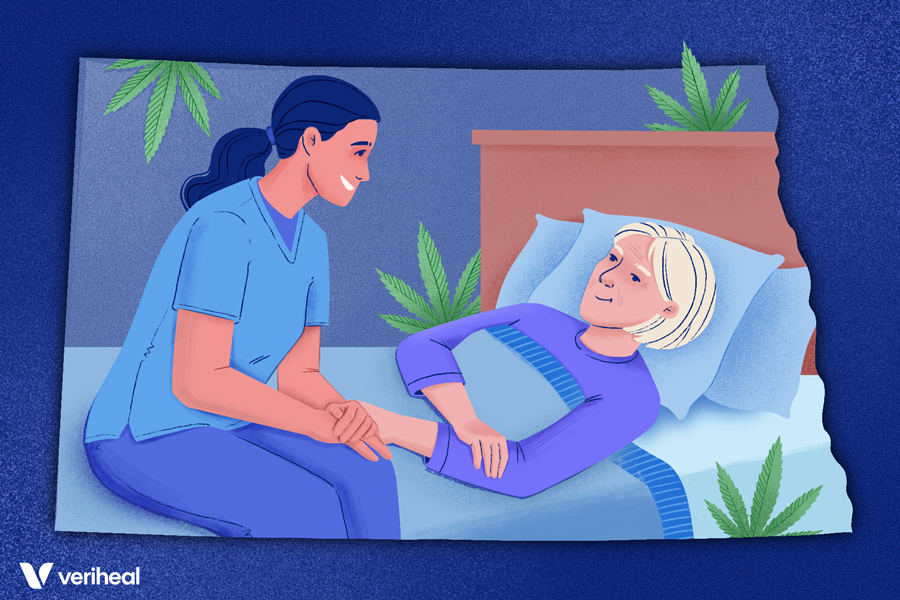In 2016, North Dakota voters approved a medical cannabis ballot. Since 2018, voters have attempted to pass adult use but have failed. North Dakota legislation has also shot down bills decriminalizing marijuana for several years. But in brighter news, legislation from Rep. Mary Schneider (D) cleared the House in an 86-6 vote this March, allowing terminally ill patients to use proof of their admittance in hospice care in lieu of a doctor’s written recommendation to register as a medical cannabis patient. The Senate unanimously, in a 45-0 vote in favor of the bill, now heads to the desk of Gov. Doug Burgum (R).
Hospice programs are primarily funded by Medicare, which causes issues for clinicians who work in the hospice setting and want to provide medical marijuana. Many hospices say they cannot legally prescribe medical marijuana because it remains a Schedule I controlled substance under federal law. With this bill and the urgency of hospice care, regulators would have to issue a cannabis patient card within 14 days of receiving the documentation, and application fees would be waived. This bill also expedites the process for caregivers. Caregivers would be allowed to pick up medical marijuana products for their patients in hospice without going through the process of a background check. This is also the process for those who are treating patients that are terminally ill.
Caregivers of Terminally Ill Patients
In a broad description, a “caregiver” is someone who is designated to supply cannabis to an individual (patient) for medical purposes. It varies state by state, the roles and responsibilities a caregiver is allowed, and how to become a medical marijuana caregiver. Most state caregivers assist those unable or unable to access medical marijuana themselves, including children and those receiving hospice care. Caregivers follow the patient’s doctor’s recommendations and assist with applying for new medical marijuana cards and card renewals.
In most states, cannabis caregivers are designated by the patient. Caregivers can have multiple patients but usually focus on one patient. The relationship between caregiver and patient is very important to ensure quality care to the patient. Registered caregivers approved by the state’s medical marijuana program are allowed to access medical marijuana legally. This includes purchasing directly from a dispensary or assisting the patient in growing their own marijuana.
Why You Should Get Your Medical Marijuana Card
Veriheal has satisfied millions of patients nationwide by giving them access to these benefits
- Larger purchase limits
- Peace of mind
- Enhanced legal protection
- Access to higher potency strains
- Save up to 25% on cannabis purchases
- Skip the line at the dispensary
Caregivers are also able to provide transportation for their patients to and from doctors or dispensaries if they are too ill or otherwise unable to do so themselves. Caregivers must also follow the various rules when it comes to who and how a patient’s medicine can be administered. Again, it varies from state to state. For example, in some states, caregivers can only administer certain types of medication. In some states, vapes are an approved method of medical marijuana. In other states, caregivers can only provide tinctures, transdermal creams, or capsules.
In most states, caregivers must follow the legal application process with their state agency to become designated. North Dakota’s bill aims to bypass this process. This process varies depending on the state. Cannabis caregivers cannot consume any of their patient’s marijuana products. In some states, caregivers cannot consume any cannabis unless they have a medical card or are located in a state that allows for adult use. Caregivers cannot cultivate cannabis for anyone besides those who are designated to receive it. Caregivers cannot sell or give away any of their patient’s cannabis to anyone.
Qualifying Conditions That Often Apply to Hospice Care
While most states with medical marijuana programs do not specifically include hospice as a qualifying condition, several other conditions apply to patients receiving hospice care. These qualifying conditions include:
- Cancer
- Chronic Pain
- Cachexia or wasting syndrome
- Intractable nausea
- Severe, painful, and persistent muscle spasms
- Positive status for Human Immunodeficiency Virus (HIV Positive)
- Acquired Immune Deficiency Syndrome (AIDS)
- Decompensated cirrhosis
- Amyotrophic Lateral Sclerosis (ALS / Lou Gehrig’s Disease)
- Agitation of Alzheimer’s disease
- Post-traumatic Stress Disorder (PTSD)
- Intractable epilepsy
- Autism with self-injurious or aggressive behavior
- Glaucoma
- Chronic Debilitating Migraines
While these are the most common qualifying conditions, each state has its own category of qualifying conditions. Again, most states do not list hospice care as a qualifying condition, but the conditions above are often found in those receiving hospice care.
What This Means for Hospice Patients
Allowing caregivers to bypass the fees and background checks required to assist patients allows those receiving hospice care to streamline their care. Those receiving hospice care often cannot leave their home or care facilities to obtain medical marijuana on their own. North Dakota’s bill will help eliminate barriers for those seeking relief with medical marijuana.
Author, Share & Comments








